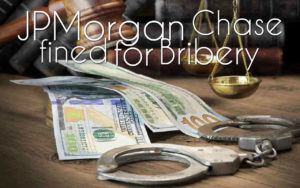A bribery scheme to “hire” the friends and relatives of potential bank customers in China in return for their business, has cost JPMorgan Chase a whopping $264 million. For the sake of information, I guess it might be interesting to relate that the scheme was starting to work as they netted $100 million in new business. All in all, it’s a banking ethics disaster.
 The JPMorgan Chase hired “hundreds” of mostly unqualified workers in the Chinese market and they were making merry progress until they were accused of violating the Foreign Corrupt Practices Act. In agreeing to the settlement, JP Morgan Chase acknowledged wrongdoing as part of the settlement. To be honest, companies caught with their fingers in the fortune cookie jar rarely admit to bribery, but apparently the fine they received was just a fraction of the fine that they could have received.
The JPMorgan Chase hired “hundreds” of mostly unqualified workers in the Chinese market and they were making merry progress until they were accused of violating the Foreign Corrupt Practices Act. In agreeing to the settlement, JP Morgan Chase acknowledged wrongdoing as part of the settlement. To be honest, companies caught with their fingers in the fortune cookie jar rarely admit to bribery, but apparently the fine they received was just a fraction of the fine that they could have received.
JPMorgan Chase Avoiding Competition
The competition for new banking business in the Chinese market is intense. JPMorgan Chase felt that the way to get new business was through bribery. Though the bank is the largest bank in the U.S. in terms of monetary resources, they chose the route of hiring people who were often referred by Chinese government officials. As a side note, I have been told more times than not that this is how it is done in China.
The proviso put forth by the executives of the bank was that as long as the relationship generated sufficient revenue, the worker would remain on the payroll. Undoubtedly there was a whistle blower who was either a disgruntled hire, or more likely from the competition.
The officials involved in eliminating international bank fraud have undoubtedly realized that the conduct of U.S. banks operating in China and in many other parts of Asia has long been a problem. In fact, no one expects that the JPMorgan Chase case will represent the only bank to get investigated and fined. Fraud of this nature definitely affects stock performance and the SEC is active in its pursuit of wrong doers.
The scandal was discovered in 2013 and since being caught, the bank is saying that they the conduct of their hiring managers was “unacceptable.” You think? Between 2006 and 2013, the bank launched a special program called: “Sons and Daughters.”
It was thinly-veiled hiring practice that was little more than a code for bribery. The applicants hired were associated with business or government officials. They were so arrogant in their “hiring” practices that the bank managers tracked the revenues brought in from the companies associated with the “hires.” The better the revenues, the longer the contract. There was nothing subtle about this scheme.
Obviously, the biggest losers (had the case not been uncovered) were the competitors. As the revenues were increasing, and the JP Morgan Chase stock price was affected, millions of shareholders were affected as well.
Banking Choices
JPMorgan Chase was convinced that the only way to succeed in the Chinese market was to be unethical. Their choice was to be unethical as a matter of policy, and the choices were so deeply ingrained that they kept records of their fraud. It was an ethical collapse, that is true, but the unspoken part of this collapse was that it would have had to have been secretly authorized at the highest levels of the organization.
“Everyone does it,” is hardly a justification. Assuming other banks were (or are) involved in bribery in Hong Kong and Mainland China, what would be next? New cars? Jewelry? Insider stock trading? Would it have become a bidding war where the new “hires” would have been thrown greater and greater amounts of money and benefits? What would have happened had the “hires” exceeded the real, hard-working employees in salary and benefits?
Ethics is not relative. Ethics provides us with guide posts, whether we’re bankers or work in a garden center. In the case of JPMorgan Chase, they couldn’t distinguish right from wrong. They deserve their fine and all of the consequences.
YOUR COMMENTS ARE WELCOME!


